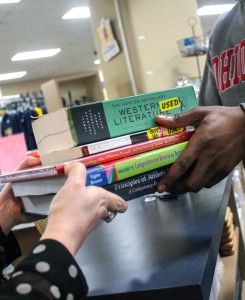
A student purchases both new and used books from the University Store.
When it comes to buying textbooks, students have options. There are electronic books, used books, new books and rentals from which to choose.
The University Store provides students with the ability to try out each of the options available for the semester. Price and quality vary depending on the student’s choice.
“I usually buy all of my books new,” said Cameron Bishop, sophomore from Taylorsville, Ky. “I may pay a little more but I’d rather have a book that I know is going to last me the entire semester than one that’s been used a few times by other people. I can also just sell it back to the bookstore once I’m done with it.”
When it comes to the difficulty level of buying books, the prepackaging option in the University Store can save students a great deal of time and can usually guarantee that they get the correct books for their classes.
When books are prepackaged, the bookstore staff will use the student’s existing schedule for the semester and charge them for each book that is listed for each class unless the professor has indicated that it is strictly optional to buy it.
“I used to prepackage my books,” Bishop said. “I stopped once I realized that I don’t always need the textbook and I can just go get the ones I need without having to pay for the ones I don’t.”
Tablets and e-readers have been climbing the technological ladder over the past few years with the releases of high definition Amazon Kindles and mini iPads. Textbook publishers have caught on to the growing trend and students can now purchase a selection of textbooks in e-book form. The prices are slightly lower than a hard copy edition of the book and certainly lighter for those who have tablets or an e-book compatible device. E-books can be purchased from both online websites and the University Store.
“I started using the e-books this semester,” said Erika Glauber, sophomore from Freeburg, Ill. “I saved a lot of money and I don’t have to carry around a book. I just bought the e-book from the (University) bookstore and it’s stored on my iPad. It’s a little difficult to get to certain things I need to find and I had to be certain that the edition matched the hard copy of the book.”
When it comes to purchasing them, reviews are always helpful before committing. The professor’s recommendation and approval to use the e-book in their class is also an important factor.
Online bookstores such as Amazon and Chegg offer a selection of textbooks in the same forms that a student can find in the University Store. With the addition of Amazon Prime, students can now pay a yearly fee and receive discounts or free shipping when purchasing books and other school items. Without the hassle of leaving the house or searching through piles of books, the student can search the ISBN number of the book they are looking for and the site will pull it up. On the other hand, not every textbook is available online.
“I buy my books from Amazon,” said Savannah Young, freshman from Cadiz, Ky. “Generally, they’re cheaper online, especially when I buy them used. A few scratches on the outside do not affect the information on the inside. I’ve never bought books from the (University) bookstore because I’ve compared the prices and I wasn’t impressed.”
Relying solely on an online bookstore may cause disappointment if the books are not available at the time they are needed or if the prices are not reasonably different than the cost at the University Store. Making comparisons and getting reviews and opinions from fellow students or professors can save time and money.
Story by Katrina Yarbrough, Staff writer